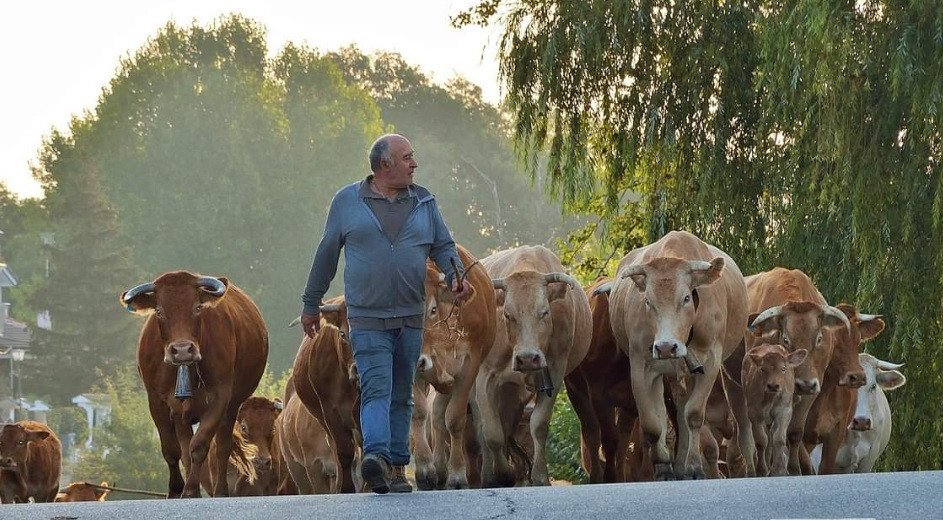Publication of the Ten Commandments of the European Commitment to Animal Welfare

Spanish livestock specialists Interovic and Provacuno, together with Hungarian JTT, have published the Ten Commandments of the European Commitment to Animal Welfare to demonstrate their utmost commitment to preserving and promoting the health of ruminants. With these commandments, they propose in response to the desires shown by Europeans.
According to another Eurobarometer, more than 95% of Europeans are concerned about the health and welfare of animals. Among them are more than 400,000 beef cattle farmers in Spain and sheep and goat farmers in Spain and Hungary. Some farmers have committed to their production and are just beginning a three-year promotion scheme, co-financed by European funds, to reinforce the European commitment to animal welfare.
The Ten Commandments states that it is a commitment made “with conviction and by their own decision” by farmers, based on World Health Organization (WHO) guidelines, current legislation and scientific developments. professionals In these ten points, advocate for a world “where animals are respected and work for animal welfare throughout society.”. The well-being which, according to the Ten Commandments, makes it necessary that “none of our animals should be hungry, thirsty, or malnourished.”
The Ten Commandments of the European Commitment to Animal Welfare also contemplate that ruminants “lead a life free from fear and pain”, that they live “free from physical and thermal discomfort”, and can express themselves with “normal behaviour”. Additionally, the commitment includes preventing injury and disease, ensuring “bio-safety, quality and traceability,” and cherishing that animals on farms are “more protected and cared for by nature itself.”
Animal Care Certificates
Likewise, in their commitment to animal welfare, these organizations have gone a step further by developing National Accreditation Authority (ENAC) accredited certifications under which farmers can demonstrate their good work and the extent and depth of this earned commitment.
These certificates represent the ultimate guarantee for citizens and a tool they can use Identification of meat products of ruminants originating from farms where all available measures have been taken To ensure that they lived a life free from hunger, thirst, malnutrition, fear, distress, physical and thermal discomfort, pain, injury, and disease, and to be free to exhibit normal behaviour.
These are certificates developed by the Spanish Society for the Protection and Welfare of Animals (Seproba) together with a group of technicians, certification experts and scientists with the aim of having an empirical basis, measuring measurable and traceable parameters in time to be able to guarantee the solvency and rigor of these seals.
Likewise, the fact that these certificates are accredited by ENAC ensures that an independent third party, who is not involved in the certification process, verifies the entire process and provides the maximum guarantees of transparency that the certification process can have, this is a legitimate pioneer in the European Union and this is available to all operators who They ask for it.
Sustainability and ‘carbon neutral’ goals
From Interovic, Provacuno and JTT they want to convey to citizens their “desire and determination to demonstrate their full commitment to carbon neutral goals and sustainability, aspects that are not possible if there is no full commitment to animal welfare”.
Animal welfare and the environment have become problems that require a solution if the EU’s 2050 carbon target is somehow to be met.
To meet consumer demand and comply with the European Zero Emissions Convention, sheep and goat meat specialists have made all their efforts to achieve A common compromise supported by the European Union based on concern for the welfare of ruminants.
To do this, the three organizations Finalizing a European Seal for Animal Welfare With the aim of informing the consumer about the origin and care of these ruminants, it represents a change that, according to these professionals, “will revolutionize consumption and production systems on a path that goes through the sustainability and traceability of food.”
With this new campaign, professionals want to highlight their promise with the sector, animals and society. A commitment that is reflected in 10 core ideas that reflect the transparency and importance of the duty acquired.

“Award-winning zombie scholar. Music practitioner. Food expert. Troublemaker.”


/cloudfront-eu-central-1.images.arcpublishing.com/prisa/AHVYMMDSTZDTDBFNZ3LMFUOKNE.jpg)








